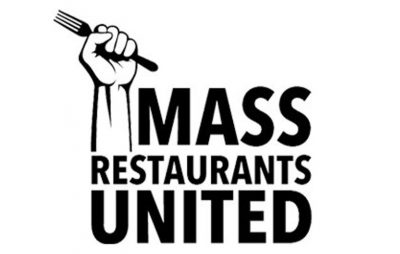Massachusetts Restaurants United, a coalition of independent restaurant owners, held a press conference Tuesday at Boston City Hall to urge legislators to quickly pass a new economic aid bill.

Wearing kitchen aprons and restaurant attire, members expressed their thoughts and concerns about a proposed amendment to a statewide stimulus bill, which would include specific provisions for struggling restaurants. Among them is the creation of a new Distressed Restaurant Trust Fund, which would provide one-time grants to restaurants in need on a competitive basis.
The trust would offer funds to restaurants in neighborhoods disproportionately affected by the pandemic. These neighborhoods are defined as those with at least 25-percent minority or non-English-proficient populations or with a median household income of 65 percent or less than the statewide median.
Although intended to financially assist small business owners, the amendment has received criticism from restaurant owners and suppliers for not going far enough.
Walter Zuromski, owner of Rhode Island-based Chef Services Group, said the bill won’t help small businesses enough to prevent closures.
“I don’t think the bill is enough,” Zuromski said. “It’s just smoke and mirrors. It’s not addressing reality.”
While the relief package provides some necessities, Zuromski said it neglects to address the everyday profitability issues plaguing restaurants.
“The industry needs a bailout just like the auto industry had,” Zuromski said. “New York clients, they’re telling me that 70 restaurants are closing a day.”
Recently, many customers have been ordering food through third-party delivery services, such as Uber Eats, that have discounts on delivery fees or food prices. This has come at the expense of restaurant owners who pay delivery expenses out of pocket, said Nancy Caswell, proprietor of Caswell Restaurant Group, which manages one restaurant in Boston and two in Newburyport, Mass.
“You end up with next to nothing,” Caswell said at the press conference. “There’s no profit. It might be break-even, but it’s probably not even that.”
With profit margins as low as 3 to 5 percent, restaurants paying additional costs could prove to be devastating for the industry.
Since the pandemic began, 20 percent of Massachusetts restaurants have closed permanently. This has caused rippling economic consequences, chef Tony Maws, a communications board member for Mass Restaurants United, said.
“We support a ton of other industries that rely on restaurants for their own survival,” Maws said at the event. “So if restaurants go away, you can say goodbye to those industries as well.”
As many in the restaurant industry struggle to stay afloat during the economic downturn, their business challenges have affected the farming and vending industries as well, Maws said.
The conference concluded with a plea to legislators and government leaders to listen to the needs of Mass Restaurants United members.
“All we’re asking from the conference committee, from our governor and from our elected leaders is to support our communities,” restaurateur Jonathan Mendez, a policy board member, said during the conference. “That’s it.”





Restaurants do need help. States many not have enough funds to support them. We need congress to pass another bill for these restaurants and other affected industries.